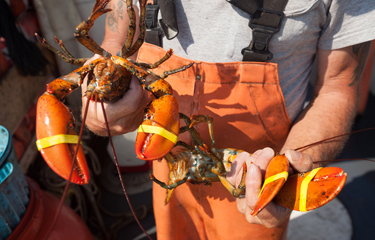A new study by the University of Maine, Orono – funded in part by NOAA Sea Grant's American Lobster Initiative – is aiming to find indicators of the industry’s resilience.
The study – lead by UMaine Assistant Professor of Marine Policy Joshua Stoll – aims to collect data to find indicators of the health of the lobster industry. Currently, several different monitoring programs keep track of the health of the lobster resource itself, but there are no equivalent monitoring programs to determine the health of the industry.
The study comes as Maine’s lobster industry – which represents the lion’s share of lobster catch in the U.S. – has been under increasing pressure from a multitude of fronts. In just the last few years, a court case threatened the complete suspension of the lobster fishery, the MSC suspended the certification of the fishery due to concerns related to the court case, the ongoing trade war between the U.S. and China has tanked the state’s exports to China, and the industry has launched a “Save Maine Lobster” campaign due to the multitude of issues.
The research project aims to find quantifiable indicators that can be used as a sort of early-warning of issues for the industry.
“The intent of this research is to develop 'sentinel' indicators of resilience for the lobster industry that can be used to detect early signs of vulnerability,” an abstract on the project states. “For this project, resilience is defined as ‘the ability of groups or communities to cope with external stresses and disturbances as a result of social, political, and environmental change.’”
Some of those indicators could be simple, like the number of fishing trips being taken over a certain period by members of the industry.
“A shift up or down could signal a change in the profitability of the fishery,” the study abstract states. “The focus of this work will be on near-real-time data streams (i.e., those that are generated on short time intervals such as daily, weekly, or monthly).”
As part of the project, the study is collaborating with the Maine Department of Marine Resources, Maine Center for Coastal Fisheries, and the Maine Lobstermen’s Association, in order to collect data on the industry. The eventual goal is to use those indicators as a support for state- and community-level management and planning for the industry.
“It also responds directly to the call for the creation of social metrics for the lobster fishery that is highlighted in the 2019 Review of the Atlantic States Marine Fisheries Commission Fishery Management Plan for American Lobster,” the abstract states.
Eventually, depending on the results of the research, similar projects could be instituted for other fisheries in the region.
“The need for sentinel indicators of resilience in fisheries is not unique to the lobster fishery and could be employed in other fisheries in New England and beyond,” the abstract states.
Photo courtesy of spwidoff/Shutterstock







